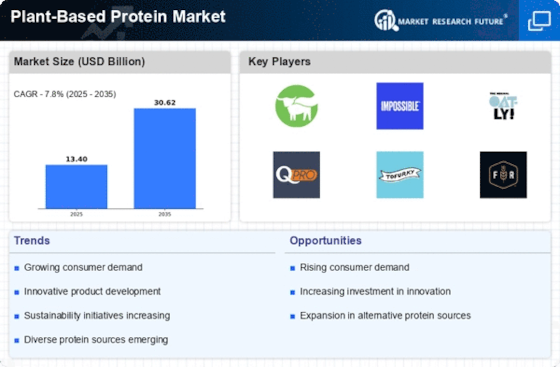Top Industry Leaders in the Plant Based Protein Market

Strategies Adopted by Plant Based Protein Key Players
The competitive landscape of the plant-based protein market is characterized by key players that play a significant role in the production, distribution, and marketing of plant-derived protein products. As of 2023, major companies influencing this market include Beyond Meat, Inc., Impossible Foods Inc., Archer Daniels Midland Company, Ingredion Incorporated, and Kerry Group.
Key Players:
Archer Daniels Midland Company (U.S.)
Cargill, Incorporated (U.S.)
Roquette Frères Le Romain (France)
Ingredion Incorporated (U.S.)
Kerry Group (Ireland)
DuPont de Nemours, Inc. (U.S.)
Now Foods (U.S.)
Tate & Lyle PCL (U.K.)
Axiom Foods Inc. (U.S.)
AMCO Protein (U.S.)
Burcon NutraScience Corporation (Canada)
BENEO GmbH (Germany)
Glico Nutrition Co., Ltd (Japan)
Glanbia plc (Ireland)
Cosucra Groupe Warcoing SA (Belgium)
Sotexpro (France)
Farbest Brands (U.S.)
Crespel & Deiters GmbH & Co. KG (Germany)
Wilmar International (Singapore)
CHS Inc. (U.S.)
The plant-based protein market revolve around product innovation, partnerships, market expansion, sustainability, and acquisitions. Product innovation is crucial, with companies investing in the development of new plant-based protein formulations, textures, and flavors to replicate traditional meat products. Partnerships with food manufacturers, retailers, and restaurant chains contribute to increasing the availability and visibility of plant-based protein products in the market. Market expansion involves entering new geographic regions and exploring diverse product categories to capitalize on the growing consumer interest in plant-based alternatives. Sustainability initiatives focus on responsible sourcing of plant-based ingredients, reducing the environmental impact of production processes, and meeting the expectations of environmentally conscious consumers. Acquisitions of other companies or technologies enable established players to broaden their product portfolios and strengthen their position in the competitive plant-based protein market.
Market Share Analysis:
The plant-based protein market include brand recognition, taste and texture of products, pricing strategies, distribution networks, and consumer education. Brand recognition is a significant factor, with consumers often choosing products from well-known and trusted brands in the plant-based protein space. The taste and texture of plant-based protein products play a crucial role in consumer acceptance, with companies striving to replicate the sensory experience of traditional meat products. Pricing strategies, whether positioned competitively or as premium products, impact market share by appealing to specific consumer segments. Efficient distribution networks, including partnerships with retailers and foodservice providers, contribute to market reach and accessibility. Consumer education initiatives, such as marketing campaigns and nutritional information, are essential for building awareness and trust among consumers considering plant-based protein alternatives.
News & Emerging Companies:
The plant-based protein market has witnessed the emergence of new companies and trends in response to the growing demand for alternative protein sources. Emerging companies often focus on niche segments, such as plant-based protein snacks, beverages, or specialty ingredients, to differentiate themselves in the competitive landscape. Additionally, advancements in processing technologies, such as extrusion and fermentation, have gained traction among emerging players seeking to enhance the functionality and nutritional profile of plant-based proteins.
Industry Trends:
Industry trends in the plant-based protein market highlight a continued focus on sustainability, research and development, and market expansion. Many companies are investing in sustainable sourcing practices, reducing water usage, and implementing eco-friendly packaging solutions to align with the increasing consumer preference for environmentally friendly products. Research and development efforts involve exploring novel plant protein sources, improving the taste and texture of plant-based products, and innovating in response to evolving consumer preferences. Market expansion strategies include entering new product categories, collaborations with culinary professionals, and exploring opportunities in emerging markets to tap into diverse consumer needs.
Competitive Scenario:
The plant-based protein market remains dynamic, with established players adapting to changing consumer preferences and emerging companies contributing to innovation. Market dynamics are influenced by factors such as the global shift towards plant-centric diets, the demand for sustainable and ethical food choices, and advancements in food technology. The resilience of the market is evident in its ability to evolve, with companies addressing the diverse needs of consumers seeking plant-based protein alternatives for health, environmental, and ethical reasons.
Recent Development
The plant-based protein market presents a competitive landscape shaped by key players employing diverse strategies to meet the evolving demands of consumers seeking sustainable and plant-centric protein alternatives. The emphasis on product innovation, partnerships, market expansion, sustainability, and acquisitions underscores the industry's commitment to addressing changing market dynamics. As the market continues to evolve, companies that can successfully balance taste, texture, sustainability, and affordability are likely to maintain a competitive edge in the dynamic landscape of the plant-based protein market.

- Beta
Beta feature










